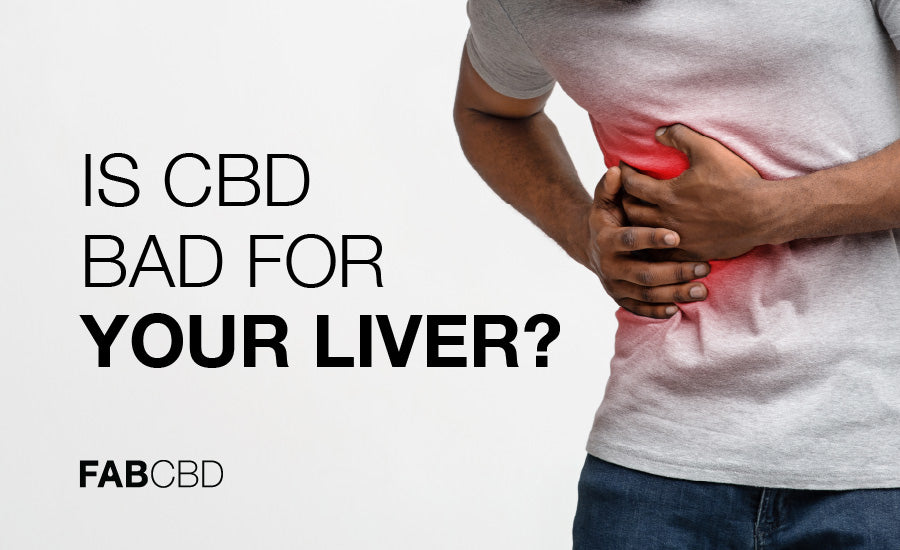As legalization of cannabis becomes increasingly relaxed, popularity is soaring for CBD products.
CBD use is becoming increasingly popular for general wellness applications and overall well-being. This leads many newcomers to CBD to wonder: are there any side effects?
This is a difficult question to answer; while CBD is non-lethal in even excessive quantities, “overdoing” it can potentially cause adverse effects. One claim that has been circulating is that CBD may be bad for your liver–but is this true?
In this blog post, we’ll look at how CBD works for the body and whether it can damage the liver.
How Does CBD Work?
CBD, or cannabidiol, is a cannabinoid, a phytochemical derived from hemp plants. Although it’s a component in cannabis, CBD doesn’t cause any “high” and is readily legal in most parts of the United States.
CBD works with receptors in the endocannabinoid system that release neurotransmitters that impact your brain. The endocannabinoid system is responsible for a variety of bodily processes. Learn more about how CBD works in the body.
Studies on CBD and the Liver
A recent study using mice suggested that high doses of CBD could lead to liver injury[1]. In this study, two groups of mice were given different levels of CBD. One group was given an acute toxicity dose of CBD at 0, 246, 738, or 2460 mg/kg for 24 hours, and another was given sub-acute toxicity at 0, 61.5, 184.5, or 615 mg/kg for ten days.
Hepatoxicity was observed in the 2460 mg/kg dose for the acute toxicity group and the 615 mg/kg dose for sub-acute toxicity. This might give the perception that CBD can disrupt liver functions, but that’s not the whole picture when compared to other studies.
For context, the equivalent dosage of 2460 mg/kg in a 70kg (154 pound) person would be 172,200mg, which is 5,740 times the recommended dose of 30mg. As you can see, the quantities utilized in this study in order to reach toxic levels are extremely far beyond what any person would ever consider ingesting.
In contrast to this study, another study with mice found that the effects of CBD can restore liver function and improve brain pathology[2]. After induction of hepatic failure in mice, the test subjects were injected with a single dose of 5 mg/kg.
It was found that liver function was restored, and levels of ammonia, bilirubin, and liver enzymes AST and ALT were improved. The study did not find any changes in control animals without hepatic failure. This means that CBD can potentially improve damaged liver function when consumed in safe doses.

Studies have concluded that CBD can impose risks, but only when consumed at doses much higher than recommended for human pharmacotherapies[3]. The possible side effects are hepatic abnormalities, diarrhea, fatigue, vomiting, and drowsiness.
What we can conclude from these animal studies is that CBD might harm our liver health when consumed in higher doses. However, it would require an exceptionally large dosage of CBD for this to happen.
How To Consume CBD Safely
As the recent study suggested, CBD is safe to consume if we follow recommended regulatory guidelines. We need to determine the safe amount of CBD to avoid adverse effects.
The most common way to consume CBD is orally, by taking a tablet, chewable, or using CBD oil tinctures.
As for how much you should take, humans can tolerate CBD up to 1,500 mg/day[4]. You should also consider your body weight when deciding your ideal dosage. It’s recommended to take 0.2-0.7 mg of CBD per pound of weight, so multiply your weight by 0.2 mg to get a rough base dosage estimate. Learn more about how much CBD you should take.
To safely consume CBD, always stick to low doses at first, regardless of your body weight. Remember to always contact a medical professional before deciding to take CBD.
Final Thoughts
CBD use is gaining traction due to its proposed wellness-supporting properties. As with any supplement, it’s essential to explore its risks and adverse effects before consuming it.
A recent study in mice has shown that CBD can be harmful to the liver when consumed in extremely high doses, far higher than the recommended intake for humans. Other research suggested that normal intakes did not have any adverse effects.
In conclusion, you should always consume CBD in moderation and discuss it with your medical practitioner before deciding on dosage.
References:
[1] Hepatotoxicity of a Cannabidiol-Rich Cannabis Extract in the Mouse Model
Ewing et al.
https://www.mdpi.com/1420-3049/24/9/1694/htm
[2] Cannabidiol improves brain and liver function in a fulminant hepatic failure-induced model of hepatic encephalopathy in mice
Avraham et al.
https://www.ncbi.nlm.nih.gov/pmc/articles/PMC3057300/
[3] Cannabidiol Adverse Effects and Toxicity
Huestis MA;Solimini R;Pichini S;Pacifici R;Carlier J;Busardò FP;
https://pubmed.ncbi.nlm.nih.gov/31161980/
[4] Safety and side effects of cannabidiol, a Cannabis sativa constituent
Mateus Machado Bergamaschi et al.







